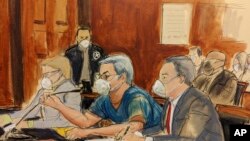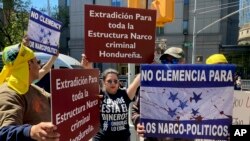Former Honduran President Juan Orlando Hernandez, with chains around his ankles, pleaded not guilty on Tuesday to U.S. drug and weapons charges in Manhattan federal court while his lawyer complained of "prisoner of war" conditions in jail.
U.S. prosecutors have accused Hernandez, a former U.S. ally, of receiving millions of dollars from drug traffickers in exchange for protection from arrest while leading Honduras from 2014 until January of this year. Hernandez used the money to enrich himself and finance his political campaigns, prosecutors said.
Hernandez, extradited from the Central American country last month, entered the plea of not guilty to three criminal counts — including conspiracy to import cocaine and weapons possession — at an arraignment before U.S. District Judge Kevin Castel.
The former president entered the courtroom wearing a blue T-shirt with chains around his ankles and spoke briefly through a Spanish interpreter to say he was not guilty.
Hernandez has in the past denied the allegations, portraying himself as a fierce opponent of drug cartels and accusing traffickers of smearing him to get revenge and lighten their sentences.
At the hearing, his lawyer Raymond Colon said Hernandez was being held in solitary confinement at Brooklyn's Metropolitan Detention Center and had not been allowed to call his family. Colon said he was denied access to visit Hernandez several times, though he has gone once and his assistants have gone.
"He's being treated like a prisoner of war," Colon said. "We're not asking for him to get special treatment because he's a former head of state, but these conditions are psychologically debilitating."
A spokesperson for the U.S. Bureau of Prisons confirmed Hernandez is being held at the Brooklyn detention facility but declined to comment on "any individual inmate's conditions of confinement."
Castel ordered prosecutors to discuss Hernandez's detention conditions with Metropolitan Detention Center officials and report back to him. He set Hernandez's next court date for Sept. 28 and said trial could begin on Jan. 17, 2023.






